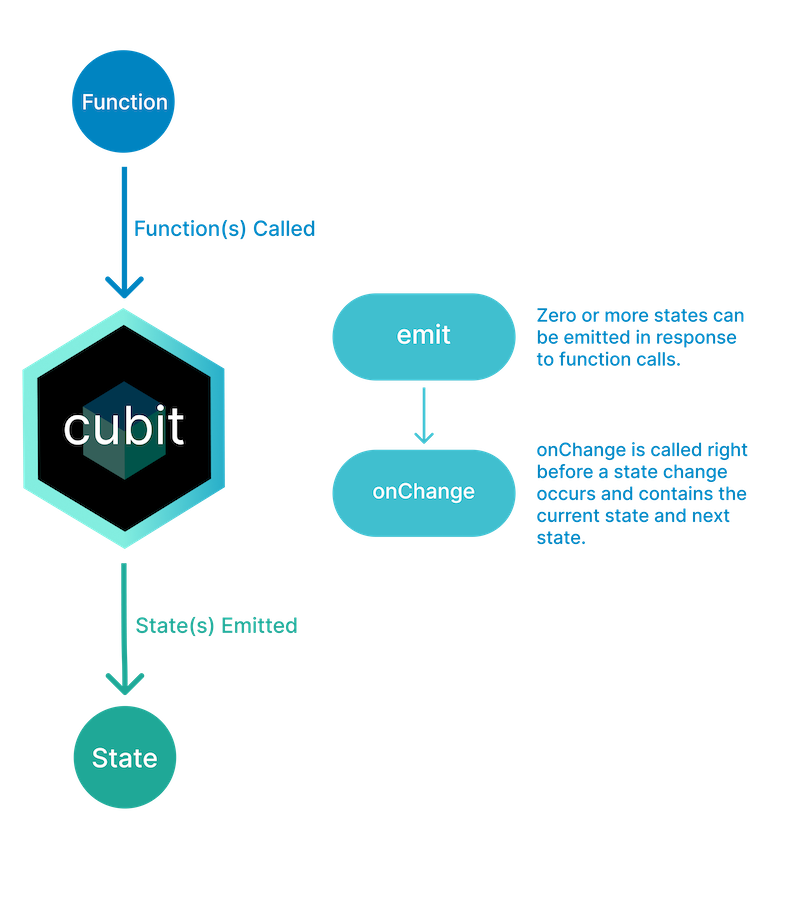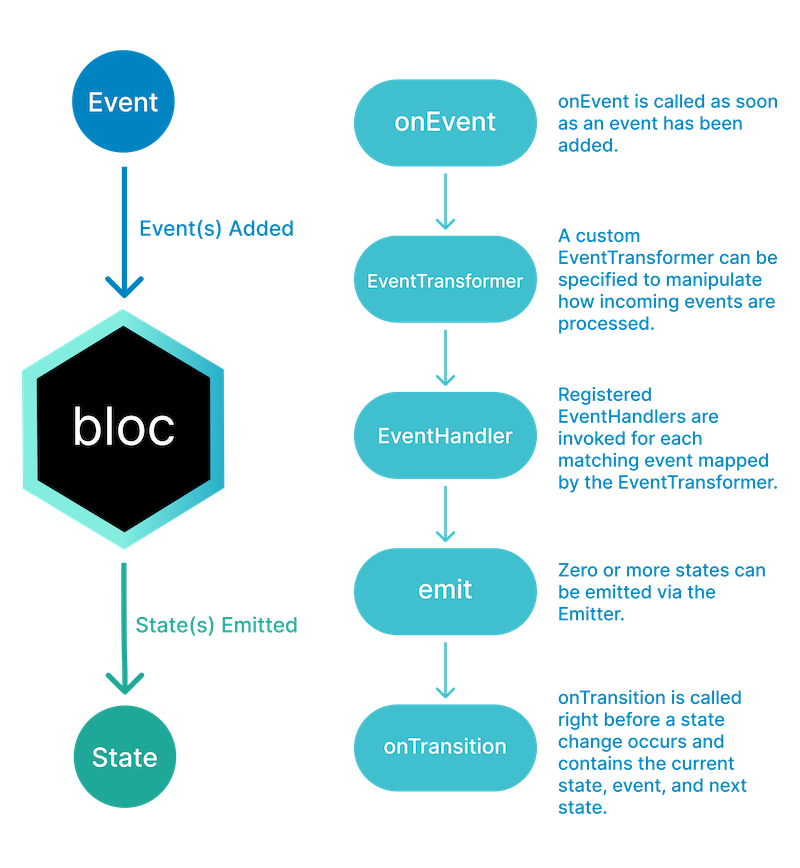bloc 9.2.0  bloc: ^9.2.0 copied to clipboard
bloc: ^9.2.0 copied to clipboard
A predictable state management library that helps implement the BLoC (Business Logic Component) design pattern.

A predictable state management library that helps implement the BLoC (Business Logic Component) design pattern.
Learn more at bloclibrary.dev!
This package is built to work with:
Sponsors #
Our top sponsors are shown below! [Become a Sponsor]

|

|

|
Overview #
The goal of this package is to make it easy to implement the BLoC Design Pattern (Business Logic Component).
This design pattern helps to separate presentation from business logic. Following the BLoC pattern facilitates testability and reusability. This package abstracts reactive aspects of the pattern allowing developers to focus on writing the business logic.
Cubit #

A Cubit is a class which extends BlocBase and can be extended to manage any type of state. Cubit requires an initial state which will be the state before emit has been called. The current state of a cubit can be accessed via the state getter and the state of the cubit can be updated by calling emit with a new state.

State changes in cubit begin with predefined function calls which can use the emit method to output new states. onChange is called right before a state change occurs and contains the current and next state.
Creating a Cubit
/// A `CounterCubit` which manages an `int` as its state.
class CounterCubit extends Cubit<int> {
/// The initial state of the `CounterCubit` is 0.
CounterCubit() : super(0);
/// When increment is called, the current state
/// of the cubit is accessed via `state` and
/// a new `state` is emitted via `emit`.
void increment() => emit(state + 1);
}
Using a Cubit
void main() {
/// Create a `CounterCubit` instance.
final cubit = CounterCubit();
/// Access the state of the `cubit` via `state`.
print(cubit.state); // 0
/// Interact with the `cubit` to trigger `state` changes.
cubit.increment();
/// Access the new `state`.
print(cubit.state); // 1
/// Close the `cubit` when it is no longer needed.
cubit.close();
}
Observing a Cubit
onChange can be overridden to observe state changes for a single cubit.
onError can be overridden to observe errors for a single cubit.
class CounterCubit extends Cubit<int> {
CounterCubit() : super(0);
void increment() => emit(state + 1);
@override
void onChange(Change<int> change) {
super.onChange(change);
print(change);
}
@override
void onError(Object error, StackTrace stackTrace) {
print('$error, $stackTrace');
super.onError(error, stackTrace);
}
}
BlocObserver can be used to observe all cubits.
class MyBlocObserver extends BlocObserver {
@override
void onCreate(BlocBase bloc) {
super.onCreate(bloc);
print('onCreate -- ${bloc.runtimeType}');
}
@override
void onChange(BlocBase bloc, Change change) {
super.onChange(bloc, change);
print('onChange -- ${bloc.runtimeType}, $change');
}
@override
void onError(BlocBase bloc, Object error, StackTrace stackTrace) {
print('onError -- ${bloc.runtimeType}, $error');
super.onError(bloc, error, stackTrace);
}
@override
void onClose(BlocBase bloc) {
super.onClose(bloc);
print('onClose -- ${bloc.runtimeType}');
}
}
void main() {
Bloc.observer = MyBlocObserver();
// Use cubits...
}
To register multiple BlocObserver instances, use MultiBlocObserver:
Bloc.observer = MultiBlocObserver(
observers: [
MyLoggingObserver(),
MyErrorObserver(),
MyPerformanceObserver(),
],
);
Bloc #

A Bloc is a more advanced class which relies on events to trigger state changes rather than functions. Bloc also extends BlocBase which means it has a similar public API as Cubit. However, rather than calling a function on a Bloc and directly emitting a new state, Blocs receive events and convert the incoming events into outgoing states.

State changes in bloc begin when events are added which trigger onEvent. The events are then funnelled through an EventTransformer. By default, each event is processed concurrently but a custom EventTransformer can be provided to manipulate the incoming event stream. All registered EventHandlers for that event type are then invoked with the incoming event. Each EventHandler is responsible for emitting zero or more states in response to the event. Lastly, onTransition is called just before the state is updated and contains the current state, event, and next state.
Creating a Bloc
/// The events which `CounterBloc` will react to.
sealed class CounterEvent {}
/// Notifies bloc to increment state.
final class CounterIncrementPressed extends CounterEvent {}
/// A `CounterBloc` which handles converting `CounterEvent`s into `int`s.
class CounterBloc extends Bloc<CounterEvent, int> {
/// The initial state of the `CounterBloc` is 0.
CounterBloc() : super(0) {
/// When a `CounterIncrementPressed` event is added,
/// the current `state` of the bloc is accessed via the `state` property
/// and a new state is emitted via `emit`.
on<CounterIncrementPressed>((event, emit) => emit(state + 1));
}
}
Using a Bloc
Future<void> main() async {
/// Create a `CounterBloc` instance.
final bloc = CounterBloc();
/// Access the state of the `bloc` via `state`.
print(bloc.state); // 0
/// Interact with the `bloc` to trigger `state` changes.
bloc.add(CounterIncrementPressed());
/// Wait for next iteration of the event-loop
/// to ensure event has been processed.
await Future.delayed(Duration.zero);
/// Access the new `state`.
print(bloc.state); // 1
/// Close the `bloc` when it is no longer needed.
await bloc.close();
}
Observing a Bloc
Since all Blocs extend BlocBase just like Cubit, onChange and onError can be overridden in a Bloc as well.
In addition, Blocs can also override onEvent, onTransition, and onDone.
onEvent is called any time a new event is added to the Bloc.
onTransition is similar to onChange, however, it contains the event which triggered the state change in addition to the currentState and nextState.
onDone is called whenever the event handler for a given event has completed.
sealed class CounterEvent {}
final class CounterIncrementPressed extends CounterEvent {}
class CounterBloc extends Bloc<CounterEvent, int> {
CounterBloc() : super(0) {
on<CounterIncrementPressed>((event, emit) => emit(state + 1));
}
@override
void onEvent(CounterEvent event) {
super.onEvent(event);
print(event);
}
@override
void onChange(Change<int> change) {
super.onChange(change);
print(change);
}
@override
void onTransition(Transition<CounterEvent, int> transition) {
super.onTransition(transition);
print(transition);
}
@override
void onDone(CounterEvent event, [Object? error, StackTrace? stackTrace]) {
super.onDone(event, error, stackTrace);
print('$event, $error');
}
@override
void onError(Object error, StackTrace stackTrace) {
print('$error, $stackTrace');
super.onError(error, stackTrace);
}
}
BlocObserver can be used to observe all blocs as well.
class MyBlocObserver extends BlocObserver {
@override
void onCreate(BlocBase bloc) {
super.onCreate(bloc);
print('onCreate -- ${bloc.runtimeType}');
}
@override
void onEvent(Bloc bloc, Object? event) {
super.onEvent(bloc, event);
print('onEvent -- ${bloc.runtimeType}, $event');
}
@override
void onChange(BlocBase bloc, Change change) {
super.onChange(bloc, change);
print('onChange -- ${bloc.runtimeType}, $change');
}
@override
void onTransition(Bloc bloc, Transition transition) {
super.onTransition(bloc, transition);
print('onTransition -- ${bloc.runtimeType}, $transition');
}
@override
void onDone(Bloc bloc, Object? event, [Object? error, StackTrace? stackTrace]) {
super.onDone(bloc, event, error, stackTrace);
print('onDone -- ${bloc.runtimeType}, $event, $error');
}
@override
void onError(BlocBase bloc, Object error, StackTrace stackTrace) {
print('onError -- ${bloc.runtimeType}, $error');
super.onError(bloc, error, stackTrace);
}
@override
void onClose(BlocBase bloc) {
super.onClose(bloc);
print('onClose -- ${bloc.runtimeType}');
}
}
void main() {
Bloc.observer = MyBlocObserver();
// Use blocs...
}
Just as with Cubit, to register multiple BlocObserver instances use MultiBlocObserver:
Bloc.observer = MultiBlocObserver(
observers: [
MyLoggingObserver(),
MyErrorObserver(),
MyPerformanceObserver(),
],
);
Dart Versions #
- Dart 2: >= 2.14
Examples #
- Counter - an example of how to create a
CounterBlocin a pure Dart app.













